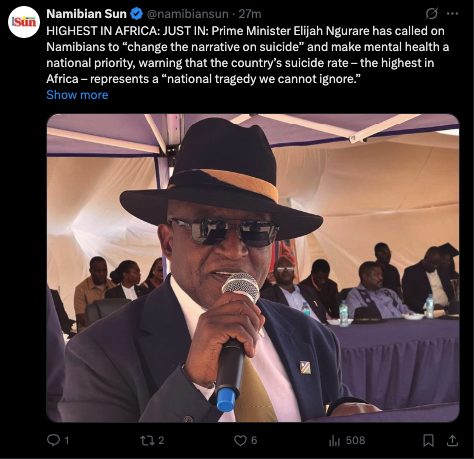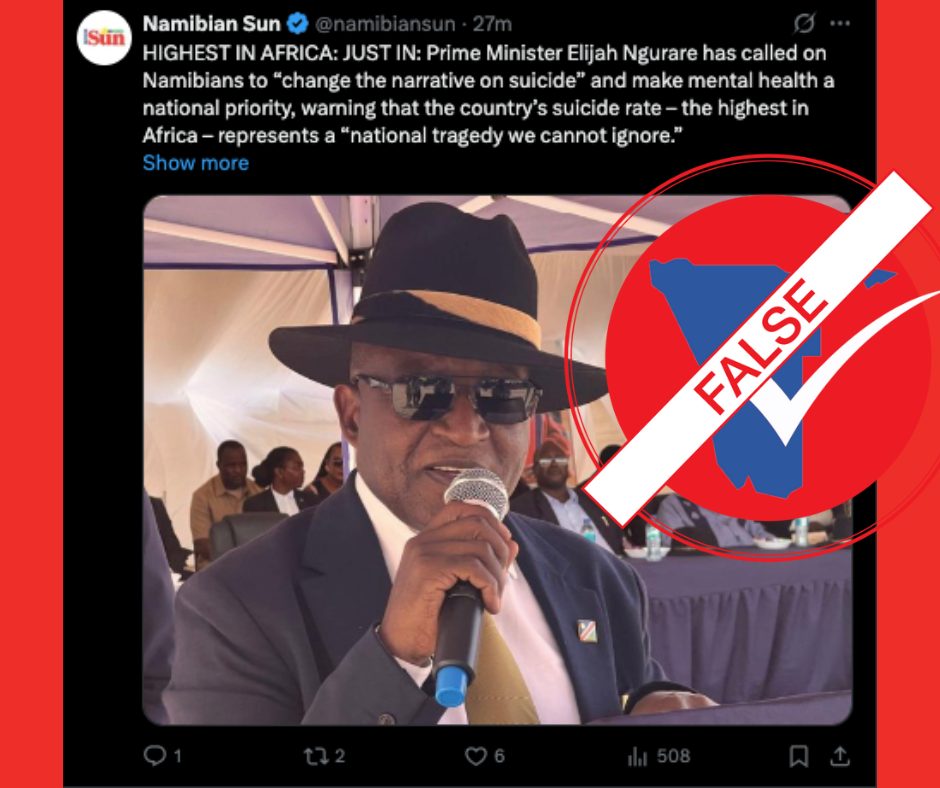Image: Namibian Sun / X
The false claim by the Prime Minister should have been checked by the media before repeating and amplifying it
EDITORIAL NOTE
Suicide is a serious societal concern, as every life lost to suicide should be seen as one too many. That said, it is questionable to what extent referencing a ranking of countries in terms of their suicide rates is meaningful, necessary or appropriate in public discussions of the prevalence of suicide in Namibia. In any case, the methodologies and accuracy of such rankings have to be critically questioned, which is what this article also attempts to encourage. This article does not underplay the tragedy of suicide, but rather seeks to encourage all stakeholders to embrace a position of accuracy when engaging in public discussions on sensitive topics such as suicide.
At the 10 October 2025 commemorative event marking World Mental Health Day, Prime Minister Elijah Ngurare, among other statements, said:
“The fact that Namibia ranks number one in Africa with respect to suicide rates is a national tragedy that we cannot ignore.” (Emphasis noted in ministerial statement)
Suicide has been a topical issue in Namibia throughout 2025 and September was designated Suicide Prevention Month by Namibian health authorities, as World Suicide Prevention Day fell on 10 September. It is in this context that the Prime Minister made the claim about Namibia being the country with the highest suicide rate in Africa.
However, the Prime Minister does not cite a source for asserting that Namibia is Africa’s top suicide hotspot, but his speech suggested he was referencing health ministry sources.
The Prime Minister’s claim was reported by the media in the days following the 10 October event, and the claim was repeated on social media feeds, such as that of Namibian Sun, which posted the following on 13 October 2025:
HIGHEST IN AFRICA: JUST IN: Prime Minister Elijah Ngurare has called on Namibians to “change the narrative on suicide” and make mental health a national priority, warning that the country’s suicide rate – the highest in Africa – represents a “national tragedy we cannot ignore.”

This was not the first time this year that it was claimed that Namibia had the highest suicide rate on the continent.
In fact, in the wake of the 10 September commemoration of Suicide Prevention Day, the false claim about Namibia’s suicide rate was also reported and amplified by sections of the news media.
On 10 September, FutureMedia News reported:
“In 2023/2024 alone, 542 lives were lost, making Namibia the country with the highest suicide rate in Africa. Over the past month, more than 10 people have died by suicide, highlighting the urgency of the crisis.”
On the same day, the Namibian Broadcasting Corporation (NBC) reported:
“As Namibia observed World Suicide Prevention Day today, statistics reveal that the country recorded 542 cases of suicide between 2023 and 2024 and 124 between January and March this year. The figures placed Namibia at the top of Africa’s suicide list, and behind these statistics are fathers, sons, husbands, and community members whose absence left families devastated.”
Neither reports cite a source for the claim that Namibia has “the highest suicide rate in Africa”.
The facts
A quick online search would have revealed that Namibia, in fact, does not have “the highest suicide rate in Africa”, and would have prevented the news media from repeating and amplifying a false claim.
According to the World Health Organization (WHO), Namibia is ranked fourth (4th) in Africa and 11th in the world with regard to suicide rate. This was even reported by the NBC in early 2025, in a report that clearly states:
“According to the World Health Organisation, Namibia currently ranks 11th globally and 4th in Africa for suicide rates.”
This information can be accessed on a web page of the WHO’s The Global Health Observatory titled Suicide rates, which is a data portal for viewing suicide-related data and information from across the world.
However, even though the WHO is the source of the suicide rate ranking being referenced, it should be noted and emphasised that the WHO gets its data from member countries self-reporting and submitting health data to the global health body. This is important to bear in mind because, when it comes to African health-related data, it is the case that data and statistics are often unreliable or incomplete, due to a range of systemic, cultural, and infrastructural challenges.
In this regard, a journal article published online by Nature.com in July 2025, stated that:
“Despite numerous health data sources and the increasing accessibility of low-cost data collection technologies, the continent still grapples with limited health data availability and poor data quality, creating a situation often referred to as “health data poverty”. Although African health institutions have been collecting data for decades, most clinical data remains undigitized and siloed within institutions generating it. This is due to a lack of comprehensive, standardized data collection processes.”
Similarly, the WHO African Region website states the following about African health information systems:
“Due to limited investment in national health information systems across most Member States in the WHO African Region, the systems face numerous challenges. As a result, data availability and quality remain insufficient in many Member States, and this hinders their ability to effectively use health data to improve health outcomes and support decision-making. For example, data collection and transmission efforts are often fragmented and heavily reliant on paper-based systems, which are inefficient, error-prone, and slow. The lack of widespread adoption and implementation of common data standards within and between countries makes it difficult to integrate and compare health data across regions and programs.”
Against this backdrop, when making statements or reporting about such sensitive issues as Namibia’s suicide rate, it should be noted that rankings may reflect outdated and unreliable figures from most other African countries. This could have the misleading effect of making countries with better reporting systems (such as Namibia or South Africa) appear worse simply because they collect more accurate data.
While suicide rankings may be useful for comparative purposes, they should be interpreted cautiously and reported on responsibly.

